Jinnah and Bhagat Singh
Chaman Lal*
Few years ago, it
was difficult to imagine any connectivity between Jinnah and Bhagat Singh,
despite having historic records. Only after A G Noorani came up with his now
much acclaimed book-The Trial of Bhagat Singh in 1996 for the first time, in which he not only discussed the background of
Central assembly debates, he reproduced Jinnah’s full speech delivered before
and after Jatin Das martyrdom attained due to hunger strike in Lahore jail on
13th September 1929.
Bhagat Singh and
Batukeshwar Dutt had gone on indefinite hunger strike from 14th June
1929 itself, when both of them after being convicted in Delhi bomb case on 12th
June at Delhi courts, were being shifted to Mianwali and Lahore jails in Punjab.
They were provided with all facilities like getting newspapers and good diet
during the trial at Delhi from 8th April 1929, the day they threw
harmless bombs in Central Assembly, now called Parliament house, till 12th
June-the day of their conviction. But after conviction and transfer order to
shift them to jails in Punjab, all facilities were withdrawn and both during
train journey to Punjab, decided to start hunger strike demanding-‘to be
treated as political prisoners and for giving them books/newspapers and better
diet.’ Bhagat Singh was taken to horrible Mianwali jail, while B K Dutt was
kept in Lahore jail, but not with his other comrades of Lahore conspiracy case.
It was only on 10th July 1929, when trial of Lahore Conspiracy case
of Saunders killing began and Bhagat Singh was brought on stretcher in the
court that other comrades came to know about hunger strike of Bhagat Singh and
Dutt. Since due to trial of Lahore Conspiracy case, they were all put together
in Lahore jail, all others including Jatin Das joined the hunger strike. Only
Jatin Das had earlier experience of observing hunger strike in jails as
political prisoner in Congress movements and he cautioned his other comrades to
be careful while proceeding on indefinite hunger strike. He declared that he
will not break his hunger strike even if others do. Once they collectively
began hunger strike and that too in Lahore-the hub of political activities and
media centre, it became national issue and was raised even in Central Assembly
session at Shimla. The Tribune from Lahore published their full statement on 14th
July, listing their demands. Bhagat Singh and Dutt wrote that during trial at
Delhi, they were treated well, but after being shifted to Mianwali and Lahore
jails, they were being treated like ordinary criminals. All hunger strikers
were force feeded by jail authorities, but Jatin Das was very tough, since he
had early experience in observing hunger strike, he would resist so much, that
using brutal force, jail officials pumped milk into his lungs, which immediately
worsened his condition. Jatin das was shifted to jail hospital, but his condition
kept on deteriorating. Apart from jail doctors, outside doctors including
Congress party leader Dr. Gopi Chand Bhargava was visiting them almost every
day and they were trying to convince Jatin Das to take some liquid diet to
prolong his life, but it was very difficult to get Jatin Das agree to that. His
younger brother Kiran Das was allowed to be with him, but he had no influence
over Jatin Das. At the insistence of Bhagat Singh, to whom Jatin Das loved and
respected, he took mild liquid diet once, but he was annoyed with Bhagat Singh
for pressuring him to take some liquid.
The matter came up for discussion on 12th
September 1929 in Central assembly. Assembly session that day had started with
the bill from Home Member Sir James Crerar, who brought the amendment that in
absence of accused in some case, trial could proceed without their presence!
Home member was questioned by Jinnah - ‘Do you wish to prosecute them or
persecute them? This was in context of Bhagat Singh and comrades not attending
court for trial, as they were on hunger strike.
Dewan Chaman Lall read Bhagat Singh/Dutt statement from 14h July 1929
Tribune issue. Jinnah intervened that day by saying-‘the man who goes on hunger
strike has a soul. He is moved by the soul and he believes in the justice of
his cause.’ The session of assembly was being held in Shimla, the summer
capital of British regime then. Tribune correspondent from Shimla reported that
Jinnah created a profound impression on the house and he won applause after
applause at arguing the case in excellent form. Jinnah referred to Punjab as
being ‘a terrible place’!
Jinnah challenged law member of the assembly to starve
himself a little to know the impact of hunger strike on human body by
saying-‘it is not everybody who can go on starving himself to death. Try it for
a little while and you will see’.
Jinnah began his speech on 12th
September, while Jatin Das was alive, but concluded on 14th
September, as on 13th September Jatin Das passed away and members
refused to participate in discussion on that day. He put the British Government
on mat by his brilliant exposure of British design-‘Don’t you think that,
instead of trying to proceed with an iron hand and pursuing a policy of
repression against your own subjects, it would be better if you realized the
root cause of the resentment and of the struggle that the people are carrying
on?
According to A.G. Noorani, Jinnah
had high esteem for Bhagat Singh and his comrades. Jinnah also said that if
this amendment was passed then the trial would be just ‘a travesty of justice’.
Jinnah was supported my
Moti Lal Nehru, M R Jaykar, Rafi Ahmed Kidwai etc. Amendment was carried
through by 55 votes against 47. Jinnah had voted against. Even in February 1929
speech in assembly, Jinnah had condoled the death of Lala Lajpat Rai, with whom
he had cordial relations. Also he pleaded for the release of Sikh leaders jailed
in connection with Sikh Gurdwara Act and opposed the detention of many
nationalists like Vallabh Bhai Patel, Anne Besant, Ali Brothers, Hasrat Mohani
etc.
Bhagat Singh, Rajguru and
Sukhdev were tried under the amended act and after a sham trial, were hanged on
23 March 1931, ‘A travesty of justice’, in the words of Jinnah.
*Chaman Lal is a retired Professor from JNU, New Delhi and is author of
‘Understanding Bhagat Singh’ and editor of Writings of Bhagat Singh.
Prof.chaman@gmail.com 09868774820
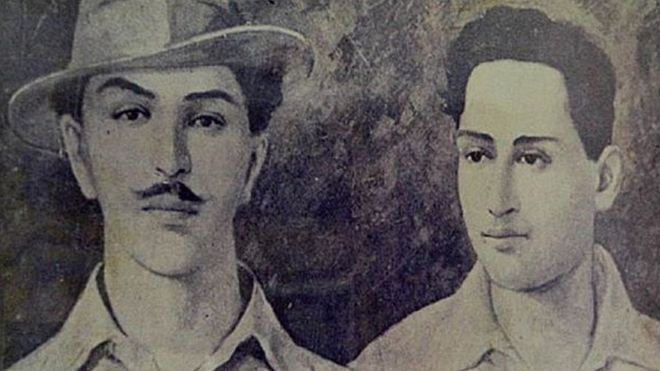 PROVIDED BY CHAMANLAL
PROVIDED BY CHAMANLAL
ਕਈ ਇਤਿਹਾਸਕ ਰਿਕਾਰਡ ਹੋਣ ਦੇ ਬਾਵਜੂਦ ਪਿਛਲੇ ਕਈ ਸਾਲਾਂ ਤੋਂ ਜਿਨਾਹ ਅਤੇ ਭਗਤ ਸਿੰਘ ਵਿਚਾਲੇ ਕੋਈ ਸੰਪਰਕ ਸੀ, ਇਹ ਸੋਚਣਾ ਵੀ ਔਖਾ ਸੀ।
ਇਹ ਉਦੋਂ ਹੀ ਸੰਭਵ ਹੋ ਸਕਿਆ ਜਦੋਂ 1996 ਵਿੱਚ ਏ.ਜੀ. ਨੂਰਾਨੀ ਦੀ ਕਿਤਾਬ- 'ਦ ਟਰਾਇਲ ਆਫ਼ ਭਗਤ ਸਿੰਘ' ਆਈ।
ਕਿਤਾਬ ਵਿੱਚ ਉਨ੍ਹਾਂ ਨੇ ਨਾ ਸਿਰਫ਼ ਕੇਂਦਰੀ ਸਭਾ (ਅਸੈਂਬਲੀ) ਦਾ ਪਿਛੋਕੜ ਦਾ ਜ਼ਿਕਰ ਕੀਤਾ ਹੈ। ਨਾਲ ਹੀ ਉਨ੍ਹਾਂ ਨੇ 13 ਸਤੰਬਰ, 1929 ਨੂੰ ਲਹੌਰ ਜੇਲ੍ਹ ਵਿੱਚ ਭੁੱਖ-ਹੜਤਾਲ ਕਰ ਰਹੇ ਜਤਿਨ ਦਾਸ ਦੇ ਦਿਹਾਂਤ ਦੇ ਬਾਰੇ ਵੀ ਲਿਖਿਆ।
ਸਹੂਲਤਾਂ ਵਾਪਸ ਲਈਆਂ
ਭਗਤ ਸਿੰਘ ਅਤੇ ਬੱਟੁਕੇਸ਼ਵਰ ਦੱਤ ਨੇ 14 ਜੂਨ, 1929 ਨੂੰ ਮਰਨ ਵਰਤ ਸ਼ੁਰੂ ਕੀਤਾ ਸੀ, ਜਦੋਂ ਦਿੱਲੀ ਬੰਬ ਮਾਮਲੇ ਵਿੱਚ 12 ਜੂਨ ਨੂੰ ਦਿੱਲੀ ਅਦਾਲਤ ਵੱਲੋਂ ਦੋਸ਼ੀ ਕਰਾਰ ਦਿੱਤੇ ਜਾਣ ਤੋਂ ਬਾਅਦ ਉਨ੍ਹਾਂ ਨੂੰ ਮਿਆਂਵਾਲੀ ਅਤੇ ਲਹੌਰ ਜੇਲ੍ਹ 'ਚ ਭੇਜਿਆ ਜਾ ਰਿਹਾ ਸੀ।
ਉਨ੍ਹਾਂ ਨੂੰ 8 ਅਪ੍ਰੈਲ, 1929, ਜਿਸ ਦਿਨ ਉਨ੍ਹਾਂ ਨੇ ਕੇਂਦਰੀ ਅਸੈਂਬਲੀ (ਹੁਣ ਸੰਸਦ ਭਵਨ) 'ਚ ਬੰਬ ਸੁੱਟਿਆ, ਤੋਂ 12 ਜੂਨ ਤੱਕ ਦਿੱਲੀ 'ਚ ਟਰਾਇਲ ਦੇ ਦੌਰਾਨ ਅਖ਼ਬਾਰ ਅਤੇ ਚੰਗੀ ਖੁਰਾਕ ਵਰਗੀਆਂ ਸਾਰੀਆਂ ਸਹੂਲਤਾਂ ਦਿੱਤੀਆਂ ਜਾ ਰਹੀਆਂ ਸਨ।
ਦੋਸ਼ੀ ਕਰਾਰ ਦਿੱਤੇ ਜਾਣ ਅਤੇ ਪੰਜਾਬ ਦੀਆਂ ਜੇਲ੍ਹਾਂ ਵਿੱਚ ਭੇਜੇ ਜਾਣ ਦੇ ਹੁਕਮ ਦੇ ਬਾਅਦ ਸਾਰੀਆਂ ਸਹੂਲਤਾਂ ਵਾਪਸ ਲੈ ਲਈਆਂ ਗਈਆਂ।
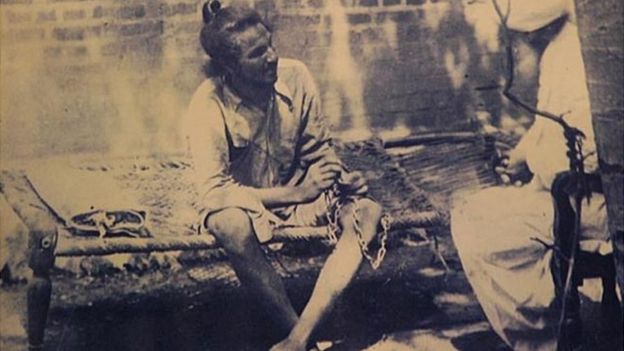 PROVIDED BY CHAMANLAL
PROVIDED BY CHAMANLAL
ਦੋਹਾਂ ਨੇ ਰੇਲ ਰਾਹੀਂ ਪੰਜਾਬ ਦੇ ਸਫ਼ਰ ਦੌਰਾਨ ਸਿਆਸੀ ਕੈਦੀਆਂ ਤਰ੍ਹਾਂ ਸਲੂਕ ਕਰਨ ਅਤੇ ਚੰਗਾ ਖਾਣਾ ਤੇ ਅਖ਼ਬਾਰਾਂ ਦੀ ਮੰਗ ਕੀਤੀ।
ਭਗਤ ਸਿੰਘ ਨੂੰ ਖ਼ਤਰਨਾਕ ਮੀਆਂਵਾਲੀ ਜੇਲ੍ਹ, ਜਦਕਿ ਬੀਕੇ ਦੱਤ ਨੂੰ ਲਹੌਰ ਸਾਜਿਸ਼ ਦੇ ਕਾਮਰੇਡਾਂ ਨਾਲ ਨਹੀਂ ਸਗੋਂ ਲਹੌਰ ਜੇਲ੍ਹ ਵਿੱਚ ਰੱਖਿਆ ਗਿਆ।
ਜਦੋਂ ਸਟਰੈਚਰ 'ਤੇ ਲਿਆਂਦਾ ਗਿਆ ਭਗਤ ਸਿੰਘ ਨੂੰ
10 ਜੁਲਾਈ, 1929 ਨੂੰ ਸਾਂਡਰਸ ਕਤਲ ਮਾਮਲੇ ਦੀ ਸੁਣਵਾਈ ਸ਼ੁਰੂ ਹੋਈ ਅਤੇ ਭਗਤ ਸਿੰਘ ਨੂੰ ਅਦਾਲਤ ਵਿੱਚ ਸਟਰੈਚਰ 'ਤੇ ਲਿਆਂਦਾ ਗਿਆ।
ਉਸ ਵੇਲੇ ਹੀ ਦੂਜੇ ਕਾਮਰੇਡਾਂ ਨੂੰ ਭਗਤ ਸਿੰਘ ਅਤੇ ਦੱਤ ਦੀ ਭੁੱਖ-ਹੜਤਾਲ ਬਾਰੇ ਪਤਾ ਲੱਗਿਆ। ਲਹੌਰ ਸਾਜਿਸ਼ ਦੇ ਮਾਮਲੇ ਕਰਕੇ ਸਾਰਿਆਂ ਨੂੰ ਲਹੌਰ ਜੇਲ੍ਹ ਵਿੱਚ ਰੱਖਿਆ ਗਿਆ ਸੀ।
ਜਤਿਨ ਦਾਸ ਸਣੇ ਹੋਰ ਵੀ ਸਾਰੇ ਭੁੱਖ-ਹੜਤਾਲ ਵਿੱਚ ਸ਼ਾਮਿਲ ਹੋ ਗਏ। ਸਿਰਫ਼ ਕਾਂਗਰਸ ਅੰਦੋਲਨ ਦੇ ਦੌਰਾਨ ਜਤਿਨ ਦਾਸ ਕੋਲ ਹੀ ਜੇਲ੍ਹ ਵਿੱਚ ਸਿਆਸੀ ਕੈਦੀ ਵਜੋਂ ਭੁੱਖ-ਹੜਤਾਲ ਦਾ ਅਨੁਭਵ ਸੀ।
ਉਨ੍ਹਾਂ ਨੇ ਆਪਣੇ ਸਾਥੀ ਕਾਮਰੇਡਾਂ ਨੂੰ ਭੁੱਖ-ਹੜਤਾਲ ਕਰਨ ਤੋਂ ਸਾਵਧਾਨ ਰਹਿਣ ਲਈ ਕਿਹਾ।
ਅਸੈਂਬਲੀ 'ਚ ਭੁੱਖ-ਹੜਤਾਲ ਦਾ ਮੁੱਦਾ
ਜਤਿਨ ਦਾਸ ਨੇ ਦਾਅਵਾ ਕੀਤਾ ਕਿ ਜੇ ਦੂਜੇ ਭੁੱਖ-ਹੜਤਾਲ ਖ਼ਤਮ ਕਰ ਵੀ ਦਿੰਦੇ ਹਨ ਤਾਂ ਵੀ ਉਹ ਭੁੱਖ-ਹੜਤਾਲ ਨਹੀਂ ਤੋੜਨਗੇ।
ਜਦੋਂ ਸਭ ਨੇ ਇੱਕਜੁੱਟ ਹੋ ਕੇ ਸਿਆਸੀ ਗਤੀਵਿਧੀਆਂ ਅਤੇ ਮੀਡੀਆ ਦੇ ਕੇਂਦਰ ਲਹੌਰ ਵਿੱਚ ਭੁੱਖ-ਹੜਤਾਲ ਕੀਤੀ ਤਾਂ ਇਹ ਕੌਮੀ ਮੁੱਦਾ ਬਣ ਗਿਆ ਅਤੇ ਸ਼ਿਮਲਾ 'ਚ ਕੇਂਦਰੀ ਅਸੈਂਬਲੀ ਸੈਸ਼ਨ 'ਚ ਇਹ ਮੁੱਦਾ ਚੁੱਕਿਆ ਗਿਆ।
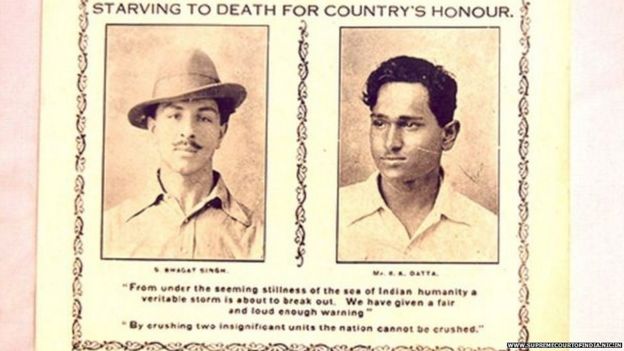 WWW.SUPREMECOURTOFINDIA.NIC.IN
WWW.SUPREMECOURTOFINDIA.NIC.IN
ਲਹੌਰ 'ਚ 'ਦ ਟ੍ਰਿਬਿਊਨ' ਵਿੱਚ 14 ਜੁਲਾਈ ਨੂੰ ਉਨ੍ਹਾਂ ਦੀਆਂ ਮੰਗਾਂ ਛਪੀਆਂ। ਭਗਤ ਸਿੰਘ ਅਤੇ ਦੱਤ ਨੇ ਲਿਖਿਆ ਕਿ ਦਿੱਲੀ ਸੁਣਵਾਈ ਦੇ ਦੌਰਾਨ ਉਨ੍ਹਾਂ ਨਾਲ ਰਵੱਈਆ ਸਹੀ ਸੀ।
ਮੀਆਂਵਾਲੀ ਅਤੇ ਲਹੌਰ ਜੇਲ੍ਹਾਂ ਵਿੱਚ ਭੇਜਣ ਤੋਂ ਬਾਅਦ ਉਨ੍ਹਾਂ ਨਾਲ ਆਮ ਅਪਰਾਧੀਆਂ ਵਰਗਾ ਹੀ ਸਲੂਕ ਕੀਤਾ ਜਾ ਰਿਹਾ ਸੀ।
ਸਾਰੇ ਭੁੱਖ-ਹੜਤਾਲ ਕਰਨ ਵਾਲਿਆਂ ਨੂੰ ਜੇਲ੍ਹ ਅਧਿਕਾਰੀਆਂ ਵੱਲੋਂ ਜ਼ਬਰਦਸਤੀ ਖੁਆਇਆ ਜਾ ਰਿਹਾ ਸੀ, ਪਰ ਜਤਿਨ ਦਾਸ ਦਾ ਇਰਾਦਾ ਬੜਾ ਪੱਕਾ ਸੀ।
ਉਸ ਨੂੰ ਭੁੱਖ-ਹੜਤਾਲ ਦਾ ਪਹਿਲਾਂ ਵੀ ਅਨੁਭਵ ਸੀ। ਉਹ ਇੰਨ੍ਹਾਂ ਵਿਰੋਧ ਕਰਦਾ ਕਿ ਫ਼ੌਜ ਜ਼ਬਰਦਸਤੀ ਉਸ ਦੇ ਫੇਫੜਿਆਂ ਵਿੱਚ ਦੁੱਧ ਪਾ ਦਿੰਦੀ, ਜਿਸ ਨਾਲ ਉਸ ਦੀ ਤੁਰੰਤ ਸਿਹਤ ਵਿਗੜ ਗਈ।
ਭਗਤ ਸਿੰਘ ਤੋਂ ਕਿਉਂ ਖਿੱਝ ਗਏ ਜਤਿਨ?
ਜਤਿਨ ਦਾਸ ਨੂੰ ਜੇਲ੍ਹ ਹਸਪਤਾਲ 'ਚ ਭਰਤੀ ਕਰ ਦਿੱਤਾ ਗਿਆ, ਪਰ ਉਸ ਦੀ ਹਾਲਤ ਵਿਗੜਦੀ ਗਈ। ਜੇਲ੍ਹ ਡਾਕਟਰਾਂ ਦੇ ਇਲਾਵਾ ਕਾਂਗਰਸ ਆਗੂ ਡਾ. ਗੋਪੀਚੰਦ ਭਾਰਗਵ ਸਣੇ ਬਾਹਰਲੇ ਡਾਕਟਰ ਹਰ ਰੋਜ਼ ਮਿਲ ਰਹੇ ਸਨ।
ਉਹ ਲੰਬੀ ਉਮਰ ਲਈ ਜਤਿਨ ਨੂੰ ਤਰਲ ਖੁਰਾਕ ਲੈਣ ਲਈ ਜ਼ੋਰ ਪਾ ਰਹੇ ਸਨ, ਪਰ ਜਤਿਨ ਦਾਸ ਨੂੰ ਸਹਿਮਤ ਕਰਨਾ ਬਹੁਤ ਔਖਾ ਸੀ।
ਉਨ੍ਹਾਂ ਦੇ ਜਵਾਨ ਭਰਾ ਕਿਰਨ ਦਾਸ ਨੂੰ ਉਨ੍ਹਾਂ ਨਾਲ ਰਹਿਣ ਦੀ ਇਜਾਜ਼ਤ ਸੀ, ਪਰ ਜਤਿਨ ਤੇ ਉਨ੍ਹਾਂ ਦਾ ਕੋਈ ਪ੍ਰਭਾਵ ਨਹੀਂ ਸੀ।
ਭਗਤ ਸਿੰਘ ਨੂੰ ਜਤਿਨ ਦਾਸ ਪਿਆਰ ਕਰਦੇ ਅਤੇ ਸਨਮਾਨ ਕਰਦੇ ਸਨ। ਉਨ੍ਹਾਂ ਦੇ ਕਹਿਣ 'ਤੇ ਇੱਕ ਵਾਰੀ ਤਰਲ ਖੁਰਾਕ ਲੈ ਲਈ। ਭਗਤ ਸਿੰਘ ਵੱਲੋਂ ਤਰਲ ਪਦਾਰਥ ਲੈਣ ਲਈ ਜ਼ੋਰ ਪਾਉਣ 'ਤੇ ਜਤਿਨ ਦਾਸ ਖਿੱਝ ਗਏ।
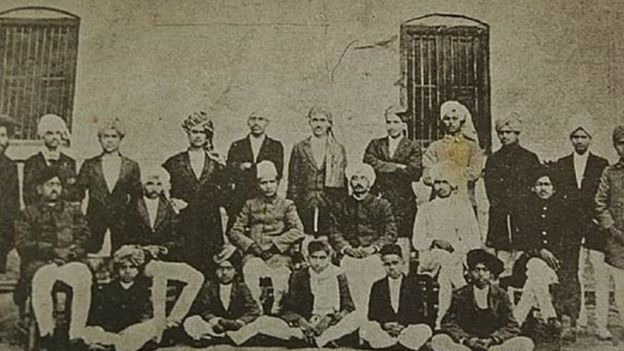 PROVIDED BY CHAMANLAL
PROVIDED BY CHAMANLAL
ਕੇਂਦਰੀ ਅਸੈਂਬਲੀ ਵਿੱਚ ਇਹ ਮਾਮਲਾ 12 ਸਿਤੰਬਰ, 1929 ਨੂੰ ਚੁੱਕਿਆ ਗਿਆ। ਅਸੈਂਬਲੀ ਸੈਸ਼ਨ ਉਸ ਦਿਨ ਗ੍ਰਹਿ ਸੱਦਸ ਸਰ ਜੇਮਸ ਕ੍ਰੇਅਰ ਦੇ ਬਿੱਲ ਨਾਲ ਸ਼ੁਰੂ ਹੋਇਆ।
ਉਨ੍ਹਾਂ ਨੇ ਮੁਲਜ਼ਮ ਦੀ ਗੈਰ-ਹਾਜ਼ਰੀ ਵਿੱਚ ਸੁਣਵਾਈ ਜਾਰੀ ਰੱਖਣ ਵਾਲਾ ਸੋਧ ਲਿਆਂਦਾ ਸੀ।
ਜੇਮਸ ਨੂੰ ਇਸ 'ਤੇ ਜਿਨਾਹ ਨੇ ਸਵਾਲ ਕੀਤਾ-"ਕੀ ਤੁਸੀਂ ਉਨ੍ਹਾਂ 'ਤੇ ਮੁਕੱਦਮਾ ਚਲਾਉਣਾ ਚਾਹੁੰਦੇ ਹੋ ਜਾਂ ਤੰਗ ਕਰਨਾ ਚਾਹੁੰਦੇ ਹੋ?" ਇਹ ਭਗਤ ਸਿੰਘ ਅਤੇ ਕਾਮਰੇਡਾਂ ਦੇ ਸੰਦਰਭ ਵਿੱਚ ਕਿਹਾ ਸੀ ਜੋ ਭੁੱਖ-ਹੜਤਾਲ 'ਤੇ ਸਨ ਅਤੇ ਅਦਾਲਤੀ ਕਾਰਵਾਈ 'ਚ ਸ਼ਾਮਿਲ ਨਹੀਂ ਸਨ।
14 ਜੁਲਾਈ, 1929 ਟ੍ਰਿਬਿਊਨ 'ਚ ਛਪਿਆ ਭਗਤ ਸਿੰਘ/ ਦੱਤ ਦਾ ਬਿਆਨ ਦੀਵਾਨ ਚਮਨਲਾਲ ਨੇ ਪੜ੍ਹਿਆ।
ਜਿਨਾਹ ਨੇ ਦਖਲ ਦਿੱਤਾ ਤੇ ਕਿਹਾ, "ਉਹ ਸ਼ਖ਼ਸ ਜੋ ਭੁੱਖ-ਹੜਤਾਲ 'ਤੇ ਜਾਂਦਾ ਹੈ ਉਸ ਦੀ ਆਤਮਾ ਹੈ। ਉਹ ਅੰਤਰਆਤਮਾ ਦੀ ਅਵਾਜ਼ ਸੁਣਦਾ ਹੈ ਅਤੇ ਨਿਆਂ 'ਤੇ ਯਕੀਨ ਰੱਖਦਾ ਹੈ।"
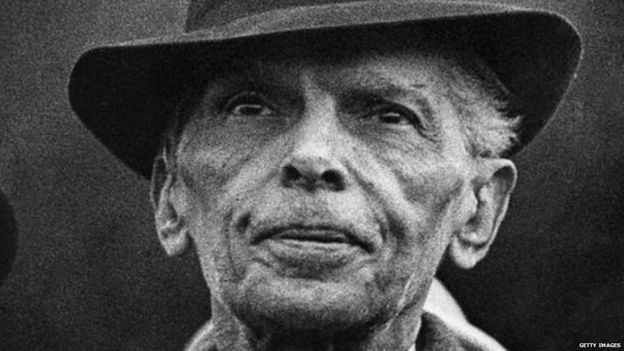 GETTY IMAGES
GETTY IMAGES
ਅਸੈਂਬਲੀ ਦਾ ਸੈਸ਼ਨ ਬ੍ਰਿਟਿਸ਼ ਰਾਜ ਦੌਰਾਨ ਗਰਮੀਆਂ ਦੌਰਾਨ ਰਾਜਧਾਨੀ ਸ਼ਿਮਲਾ 'ਚ ਚੱਲ ਰਿਹਾ ਸੀ।
ਟ੍ਰਿਬਿਊਨ ਦੇ ਸ਼ਿਮਲਾ ਪੱਤਰਕਾਰ ਨੇ ਰਿਪੋਰਟ ਕੀਤਾ ਕਿ ਜਿਨਾਹ ਨੇ ਸਦਨ ਵਿੱਚ ਪ੍ਰਭਾਵ ਪਾ ਦਿੱਤਾ ਸੀ ਅਤੇ ਮਾਮਲੇ ਵਿੱਚ ਵਾਰ-ਵਾਰ ਦਲੀਲਾਂ ਦੇਣ 'ਤੇ ਸ਼ਲਾਘਾ ਹੋਈ।
ਜਿਨਾਹ ਨੇ ਪੰਜਾਬ ਨੂੰ 'ਡਰਾਉਣੀ ਥਾਂ' ਕਿਹਾ।
'ਹਰ ਕੋਈ ਮਰਨ-ਵਰਤ ਨਹੀਂ ਰੱਖ ਸਕਦਾ'
ਜਿਨਾਹ ਨੇ ਅਸੈਂਬਲੀ ਦੇ ਕਾਨੂੰਨੀ ਸਦੱਸ ਨੂੰ ਥੋੜੀ ਭੁੱਖ-ਹੜਤਾਲ ਕਰਨ ਲਈ ਕਿਹਾ ਤਾਕਿ ਮਨੁੱਖੀ ਸਰੀਰ 'ਤੇ ਭੁੱਖ-ਹੜਤਾਲ ਦੇ ਅਸਰ ਬਾਰੇ ਪਤਾ ਲੱਗੇ।
ਉਨ੍ਹਾਂ ਨੇ ਕਿਹਾ, "ਹਰ ਕੋਈ ਮਰਨ-ਵਰਤ ਨਹੀਂ ਰੱਖ ਸਕਦਾ। ਕੁਝ ਦੇਰ ਕੋਸ਼ਿਸ਼ ਕਰਕੇ ਦੇਖੋ ਤੁਹਾਨੂੰ ਪਤਾ ਲੱਗ ਜਾਏਗਾ।"
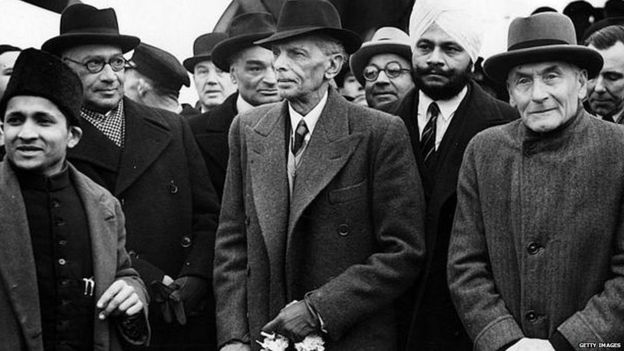 GETTY IMAGES
GETTY IMAGES
ਜਿਨਾਹ ਨੇ ਆਪਣਾ ਭਾਸ਼ਣ 12 ਸਿਤੰਬਰ ਨੂੰ ਸ਼ੁਰੂ ਕੀਤਾ, ਜਦੋਂ ਜਤਿਨ ਦਾਸ ਜ਼ਿੰਦਾ ਸਨ ਅਤੇ 14 ਸਿਤੰਬਰ ਨੂੰ ਖ਼ਤਮ ਕਰ ਦਿੱਤਾ ਸੀ।
13 ਸਿਤੰਬਰ ਨੂੰ ਜਤਿਨ ਦਾਸ ਦੀ ਮੌਤ ਹੋ ਗਈ ਅਤੇ ਮੈਂਬਰਾਂ ਨੇ ਚਰਚਾ ਵਿੱਚ ਸ਼ਾਮਿਲ ਹੋਣ ਤੋਂ ਇਨਕਾਰ ਕਰ ਦਿੱਤਾ ਸੀ।
ਉਨ੍ਹਾਂ ਨੇ ਬ੍ਰਿਟਿਸ਼ ਸਰਕਾਰ ਨੂੰ ਝਾੜ ਪਾਈ, "ਤੁਹਾਨੂੰ ਨਹੀਂ ਲਗਦਾ ਕਿ ਸਖ਼ਤੀ ਨਾਲ ਪੇਸ਼ ਆਉਣ ਅਤੇ ਦਬਾਅ ਨੀਤੀ ਨਾਲੋਂ ਲੋਕਾਂ ਦੇ ਰੋਸ ਅਤੇ ਸੰਘਰਸ਼ ਦੀ ਵਜ੍ਹਾ ਜਾਣੀ ਜਾਵੇ।"
ਏ.ਜੀ. ਨੂਰਾਨੀ ਮੁਤਾਬਕ ਜਿਨਾਹ ਨੂੰ ਭਗਤ ਸਿੰਘ ਅਤੇ ਕਾਮਰੇਡਾਂ ਲਈ ਸਨਮਾਨ ਸੀ। ਜਿਨਾਹ ਨੇ ਕਿਹਾ ਕਿ ਜੇ ਇਹ ਸੋਧ ਹੋ ਗਈ ਤਾਂ ਇਹ ਸੁਣਵਾਈ 'ਨਿਆਂ ਦਾ ਮਹਿਜ਼ ਇੱਕ ਮਖੌਲ' ਬਣ ਕੇ ਰਹਿ ਜਾਏਗੀ।
 WWW.SUPREMECOURTOFINDIA.NIC.IN
WWW.SUPREMECOURTOFINDIA.NIC.IN
ਮੋਤੀ ਲਾਲ ਨਹਿਰੂ, ਐਮ.ਆਰ. ਜੈਕਾਰ, ਰਫ਼ੀ ਅਹਿਮਦ ਕਿਡਵਈ ਨੇ ਜਿਨਾਹ ਦਾ ਸਮਰਥਨ ਕੀਤਾ। ਇਹ ਸੋਧ 55 ਚੋਂ 47 ਵੋਟਾਂ ਨਾਲ ਪੂਰਾ ਹੋਇਆ।
ਜਿਨਾਹ ਨੇ ਇਸ ਦੇ ਵਿਰੋਧ 'ਚ ਵੋਟ ਪਾਈ। ਅਸੈਂਬਲੀ 'ਚ ਫਰਵਰੀ, 1929 ਦੇ ਭਾਸ਼ਣ ਦੌਰਾਨ ਜਿਨਾਹ ਨੇ ਲਾਲਾ ਲਾਜਪਤ ਰਾਏ ਦੀ ਮੌਤ 'ਤੇ ਸੋਗ ਜ਼ਾਹਿਰ ਕੀਤਾ, ਜਿੰਨ੍ਹਾਂ ਨਾਲ ਉਸ ਦੇ ਚੰਗੇ ਸਬੰਧ ਸਨ।
ਉਨ੍ਹਾਂ ਨੇ ਸਿੱਖ ਆਗੂਆਂ ਦੀ ਰਿਹਾਈ ਦੀ ਵੀ ਮੰਗ ਕੀਤੀ ਜੋ ਸਿੱਖ ਗੁਰਦੁਆਰਾ ਐਕਟ ਦੇ ਸਬੰਧ 'ਚ ਜੇਲ੍ਹ 'ਚ ਬੰਦ ਸਨ।
ਉਨ੍ਹਾਂ ਨੇ ਵੱਲਭ ਭਾਈ ਪਟੇਲ, ਐਨੀ ਬੇਸੰਟ, ਅਲੀ ਭਰਾਵਾਂ, ਹਸਰਤ ਮੋਹਾਨੀ ਵਰਗੇ ਕਈ ਰਾਸ਼ਟਰਵਾਦੀਆਂ ਨੂੰ ਨਜ਼ਰਬੰਦ ਕਰਨ ਦਾ ਵੀ ਵਿਰੋਧ ਕੀਤਾ।
ਭਗਤ ਸਿੰਘ, ਰਾਜਗੁਰੂ ਅਤੇ ਸੁਖਦੇਵ ਤੇ ਸੋਧ ਐਕਟ ਦੇ ਅਧੀਨ ਕਾਰਵਾਈ ਹੋਈ ਅਤੇ 23 ਮਾਰਚ, 1931 ਨੂੰ ਫਾਂਸੀ ਚੜ੍ਹਾ ਦਿੱਤਾ ਗਿਆ। ਜਿਨਾਹ ਦੇ ਸ਼ਬਦਾਂ ਵਿੱਚ 'ਨਿਆਂ ਦਾ ਮਖੌਲ' ਬਣਾਇਆ ਗਿਆ।
ਪ੍ਰੋਫੈਸਰ ਚਮਨਲਾਲ ਜੇਐਨਯੂ ਦੇ ਸੇਵਾਮੁਕਤ ਪ੍ਰੋਫੈਸਰ ਹਨ ਅਤੇ 'ਅੰਡਰਸਟੈਂਡਿੰਗ ਭਗਤ ਸਿੰਘ' ਕਿਤਾਬ ਦੇ ਲੇਖਕ ਹਨ।
No comments:
Post a Comment